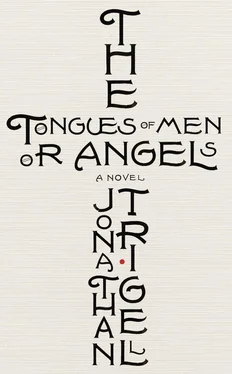Useful nods, though uncertainly. He couldn’t pretend to understand all of it, if the truth be told. But the thing is, Paul says that you don’t need to: to be saved you only have to declare with your mouth and believe with your heart that Jesus is the Lord, to eat and drink of His body and blood, and be baptized. There is a beautiful sufficiency in that.
‘So when I left Athens and came to the city of Corinth, Useful, I was resolved to know nothing. My message and my preaching were not accompanied by clever words, but by a display of the Spirit’s power. And there in that great place I found a multitude of followers eager to embrace the self-same things that those wise Athenians thought so ridiculous. And a great and numerous community was founded there at Corinth.’
‘And then from Corinth you came to Rome?’ Useful asks.
‘Eventually, though not by a straight road. But I don’t think we even have time for you to finish writing this story, Useful. I fear that, because of my love for you, I must send you away, while I still can.’
‘What do you mean, Master?’
‘I have been persecuted enough times by now, Useful, to recognize its stirrings.’ Paul half cups his hand, almost as though he tries to mask his words from Manius, though that is hardly possible with the legionary lying right beside him. ‘Since the fire, things have grown grim for the people of Rome. They need someone to blame. And from the tattle I hear on the wind, I suspect that the scapegoat has been chosen.’
‘Then I must stay here to support you through whatever hardships may be coming,’ Useful says.
Paul smiles at him. ‘No, my fellow soldier. The greatest kindness you can do me now is to be safe. I will write a letter to commend you back to Philemon, your former owner, and bid him to forgive you. He won’t refuse my wishes. I am an old man and a prisoner for Jesus, and you have become like my son while I have been in chains for the message. You are my very heart and I would not have you endangered. I will implore Philemon to take you back — no longer as a slave, but better than a slave, as a dear brother. And if Philemon believes that you have done him any wrong or owe him anything, then he must charge it to my account. I will write so with my own hand. Though he can hardly ask me to pay anything, since he owes me his very soul.’
A single droplet descends Useful’s giant boy’s head and he clutches Paul, tight as to a mast in a storm. Manius glances scornfully at the emotional display, then shuts his one eye again, in so doing renewing the intimation of violence in that abyss of scar, which runs across the void of his other eye-socket.
‘Don’t cry for me, Useful,’ Paul says. ‘I don’t fear death and through my bravery the Messiah will be exalted always, whether I live or die. If I continue living, fruitful labour will be the result, but to die is also to gain. Life or death, I don’t even know which I would prefer of the two: for my followers’ sake it is better that I remain alive, but I have the desire to leave this world and be with the Messiah. Once I was scared that I would die before my work was done. But now I grow impatient of the Christ’s return. I want to participate in His sufferings, become like him in His death and so attain resurrection.’
Twenty-two Years after the Crucifixion
The tomb was empty. Of that there was no doubt. That was the unarguable fact. The women and James had seen the rich man’s servants put the body there, in a freshly excavated cave, where no one had ever been laid. The women had watched from a distance. They had marked the spot well. And all of them agreed which burial-crypt it was. But when the women returned, on the morning after the Sabbath had ended — very early, just after sunrise — they found the body gone. The new moon of the tomb cover had been rolled away and they could see the place where Yeshua had been laid. But he was not there.
Miriam from Magdala fetched Cephas and James, yelling: They have taken the Master out of the tomb, and we don’t know where they have put him!
So Cephas and James ran together, bare feet upon the hard ground. Fleet James, faster than Cephas, was crouched down staring into the glimless tomb interior by the time Cephas got there. But Cephas was first inside, squeezing through the narrow entrance hole. Cephas saw the linen cloths, sprawled as if shed on the stone niche, and the handkerchief, which must have been placed on Yeshua’s head, not lying with the shrouds, but rolled up in a separate place.
Cephas and James and all the women witnessed that the corpse had vanished. But they did not yet understand what that meant. So afterwards they went back to their lodgings.

The tomb was empty. Of that there was no doubt. That was the unarguable fact. No one could dispute the empty tomb. But the rest of it hadn’t been clear to begin with, not to Cephas.
And maybe things get even less clear with time. Memories are like bait-fish scattered in a lake, gradually drifting from sight, eventually to be consumed or just to disappear into the darkness.
At the end of the eight days of the Passover, the disciples wept and mourned and each one returned to his home, grieving for what had happened. Cephas had journeyed back to Galilee, slumped under a burden heavier than any pack-mule’s. Sleepless with grief in the small-hour paranoia of the silent roadside nights.
Cephas came home to a dingy room, lit only by the light from the wood-barred window; walls whitewashed with grey; floor of baked clay. He returned to the sorrowful but knowing embrace of his stoical wife. To his sallow, edgy children, grown fearful of him in his long absence, standing well back, tattered shawls and the rear wall making each other dirtier.
When his wife brought a basin to wash the road from him, Cephas saw his own face, looking not just lined but channelled, as if the numberless tears had actually eroded it.
In the weeks that followed, persuaded by the hungry stares of his children, Cephas resumed fishing. He launched his ramshackle little craft back onto the Galilee Sea. And he became like that great lake too, like a body of water: so sorrowful was he that the tears became him and he became the tears. He was wet with them and filled with them and composed of them.
But Cephas discovered that he didn’t love Yeshua any less, just because he was dead. If you can love a man enough to leave your work and family and wife and life, then that is a man for whom you have an ocean of love, wider by far than Galilee’s presumptuous lake. And Cephas’s love if anything grew even stronger, coloured by grief and guilt.
Neither did it feel like Yeshua loved Cephas any less, through being dead. It didn’t seem like mere death had conquered that love.
And sometimes, when out on the sea that isn’t, when letting his net drift or repairing a rent, Cephas would be quite certain that someone was sitting in the small vessel just behind him. And he knew that the someone was Yeshua. Cephas would speak to him; Cephas would say he was sorry, for his failure and betrayal, he would sob that his great love had not gone. And ask what he should do.
And sometimes Yeshua would answer.
If Cephas turned too suddenly, Yeshua would vanish. But if Cephas could be content to believe that Yeshua was there. If Cephas had faith sufficient not to look, but just to trust, then he could keep hold of Yeshua’s presence and even see him on occasion, reflected on a knife blade, or from a sunlit wave. And Cephas was sure that afterwards the nets curled in the stern were a little flattened and warmer to the touch, just as if they had been sat upon.
And Yeshua told Cephas that The Way was not over yet, any more than it had been after Baptizer John’s death. Yeshua told Cephas that he would come back. Yeshua said that soon the Lord God would wipe away the tears from all faces and swallow up death for ever. Just as the Prophet Isaiah said He would. Yeshua reminded his friend of a promise that this generation would not pass away before the dawn of the new age on earth. Before their lands would be free and peace would descend. Yeshua said that God’s Kingdom would still come and God’s will would still be done, just as he had pledged while alive.
Читать дальше













